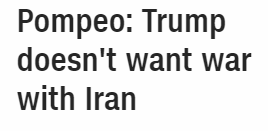
Melissa Joskow / Media Matters
As tensions escalate between Iran and the United States, calls are also on the rise for the media to remain skeptical of the White House's claims of Iran's aggression and the retaliatory actions the U.S. is planning -- especially given the administration's long history of dishonesty. In one of the latest examples, Columbia Journalism Review (CJR) observed that the “US coverage of the latest Iran episode seems to be falling into some old, bad habits.”
On June 18, CJR noted that while “the Trump era writ large has brought out the skeptical side in many reporters, and it seems that some of them have applied it to the Iran story,” many in the media have also fallen into familiar, harmful patterns. These patterns include framing Iran “as a menacing, unilateral aggressor whose actions necessitate a strong American response” and publishing headlines and tweets that privilege misinformation by quoting members of the administration without challenging their claims. For example:
CNN:

NPR:

Politico:

The Wall Street Journal:

Considering the White House's unprecedented track record of lying and the fact that it has actually covered up intelligence, news reports need to grapple with the sheer dishonesty permeating the Trump administration. The president himself has lied over 10,000 times since taking office, according to The Washington Post. His lies have covered issues both big, like Iran, and small, like his leisure time with Queen Elizabeth II. Despite the president’s torrent of lies, administration members of all ranks routinely line up to defend him. Additionally, multiple Trump Cabinet secretaries have been accused of lying -- even to Congress. Given these facts, it’s insufficient for news reports to mention the administration’s utter lack of credibility merely as an afterthought -- when it’s mentioned at all -- rather than as a core of their reporting, as have CNN and MSNBC.
The need for skepticism in media coverage is even more urgent given that two of Trump’s top national security officials -- Secretary of State Mike Pompeo and national security adviser John Bolton -- have a combined 17 years minimum of advocating for military action against Iran, including regime change.
In 2018, the Los Angeles Times described Pompeo as “a notable hawk” on Iran, highlighting his record of seeking confrontation up to and including “the ouster of the theocracy” and his calls in 2014, as the Iran nuclear deal was being negotiated, to launch airstrikes against Iran’s nuclear facilities. When the deal was finalized, Pompeo “bluntly mischaracterized” the effects of President Barack Obama’s negotiations as a “surrender” to Tehran.
Bolton, who has fantasized about hypothetical situations that could give the U.S. a casus belli to initiate strikes, may be the most hawkish member of the administration. Bolton’s former career as a Fox News contributor makes it no secret that he wants to invade Iran and overthrow the government. In 2016, he commented that “our objective should be to overthrow the regime in Tehran.” In 2012, Bolton told Fox Business host Lou Dobbs that “the preemptive use of military force” is “the only thing” that will prevent Iran from getting nuclear weapons. That same year, he also said on Fox that “I don’t think it’s in our interest to stay out” of a hypothetical war between Israel and Iran because ultimately, the alternative would be “an Iran with nuclear weapons.” As far back as 2010, he insisted to Fox’s Sean Hannity that “the United States ought to help Israel” launch military strikes to “take out” Iranian nuclear facilities. The national security adviser’s thirst for war against Iran is so well-known that it has become a running joke.
It may yet turn out that attacks on oil shipments in the Persian Gulf were connected to the Iranian government, but the fact remains that the Trump administration simply has not proven it. Furthermore, even Iran was behind the attacks, there is simply no reason to believe Pompeo’s claim that the administration doesn’t want a military conflict with Iran. Irrespective of the likelihood of Iranian involvement, the Trump administration has provided over 10,000 reasons for the media not to trust it, including directly lying to reporters’ faces.
The administration, not just Trump, has a credibility crisis, and the media outlets flirt with disaster by not making that lack of credibility clear in reporting on the administration’s actions regarding Iran.